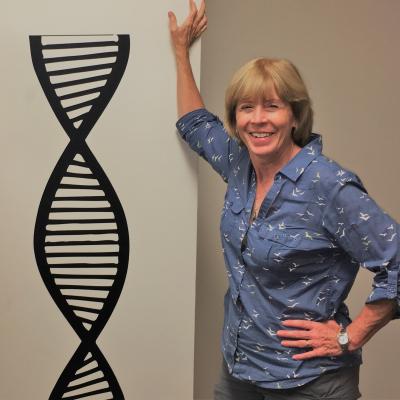Achieving Advanced Degrees
Pursuing higher education after receiving an undergraduate degree is an important and life- and career- changing decision. Whether it's a master's degree, Ph.D., or postdoctoral work. The pursuit of an advanced degree is a time consuming endeavor. For women in STEM fields, this decision is highly multifaceted. Many factors come into play. Such as, whether, what type of support did the woman receive? Did they recieve the care that is needed for anyone, let alone a woman, to succeed academically? Did they get the support needed from their advisors, parents, financial stability, etc.? Gender plays a powerful role in guiding career paths. Men historically have had more significant roles in STEM than women. Of the women interviewed for this project, it is important to note that their experiences varied. Kirtly Parker Jones, MD mentions an early experience with a sabotaged project. Sparking her recognition of the possibility that women's reproductive health was devalued. While, Cynthia Burrows, PHD cites male mentorship as the push that encouraged her to achieve a Ph.D.
"Somewhere in my first year, during basic anatomy, we had the opportunity to... I think it was actually a research experiment that class was divided into. Students could do anatomy on the entire body, or you could divide up into teams, do one part of the body in depth and then teach the other people who did the team concept, your part of your body. I was very interested in hands because hands are pretty amazing. I was paired with a group of people who wanted to do hands. But three of the women, four of the women in my class decided they wanted to do the female pelvis. So, they were strong women. As they would say, 'they were feminists.' Where I didn't even think about that. They had decided they wanted the female pelvis and one morning they came to their body, that they had been carefully dissecting, so they could teach it. However, it had been mutilated. Essentially, all of the female parts had been torn up. We don't know who did it, but this to me, was the first time I actually saw that women could be both be registered against and there could be, this violence. It had my eyes opened. "
"I think that every, everybody needs to get pushed out of their comfort zone a little bit, and then they really discover what they're capable of. That certainly happened to me. I think that when I decided to apply for academic positions, there was a post-doc in France. I called back to Cornell to my PhD advisor and we had this little chat— very short!—because, you know, few dollars per minute to call from France. And so I talked to him about, you know, my plan, I was going to apply to academic jobs. And then he said a key thing… that made all the difference. He said, 'Well, I am going to assume that you are only applying to the very best chemistry departments in the US, and I will write my letter accordingly.... Oh, okay. I better apply to the very best places in the world. That's what's expected of me. So...I don't know if I would have without that little nudge."
Another theme from the interviewees was the often uncertain nature of the process of obtaining an advanced STEM degree as a woman. Self-doubt, imposter syndrome, and general uncertainty of the future are obstacles cited by many of these women, speaking to the importance of having a support system in place. Holly Sebahar, PhD describes how she resorted to being "scrappy" in the face of anxiety, and S. McKenzie Skiles, PhD explained how she found her way over time and did not start her academic career with a set plan.
"So during that time, I think that's when it really stirred up like, ‘What am I doing here? Am I good enough to get my PhD? Am I actually qualified for this job? Should I be going off to have a family instead?’ I think that was the most challenging time. So I think reaching out to my coworkers, to my family, to my—I talked to my PI about it. He was helpful. And then I think it— I had to just be scrappy." -Holly Sebahar, PhD
"I didn't know when I went to do my master's that I would do a PhD. Or even that when I did a PhD that I would end up becoming a professor. Each step along the way was like, oh, I'll do a little bit more and see if I still like it. And then it kind of ended up with me doing research forever. It was sort of a building block process. And not fully leaping in and knowing exactly what I wanted to do the whole time." -S. McKenzie Skiles, PhD
According to a research study done by the Frey research group. There are two major factors that lead to the high turnover rate of women in STEM. Perceived belonging and belonging uncertainty. Belonging, as defined in the accompanying paper, is a "fundamental human need that influences achievement." Perceived belonging in this study refers to "overall evaluations of their fit and social relationships." While belonging uncertainty is related to the stability of a student's self-perceived ability and confidence in the observed area of study over time.
The study concluded that negative shifts in perceived belonging and increased uncertainty were fed by classrooms dominated by one gender or the other. With messages that learners' abilities are fixed (as opposed to the promotion of a growth mindset in the classroom). As well as gender stereotypes about quantitative reasoning. Women and minority groups tended to report lower perceived belonging and higher belonging uncertainty. While this study was done at the freshman undergraduate level for chemistry courses. Experiences at this foundational level must certainly contribute to decision-making for women aspiring to STEM careers.
For the women that stick with the STEM field. The best advice is to surrounding oneself with a supportive community is key to completing any advanced degree. This could be classmates, people outside of academia, or professors, among others. Holly Sebahar, PhD describes how she created a sense of belonging for herself in her organic chemistry graduate program.
"There was a good mix of men and women in the program, and even though a lot of the organic chemists were men, I got to know their wives very well because we did a lot of social stuff outside of school, so it wasn't necessarily— I did have a lab that was, you know, probably very high percentage men, but I never really felt isolated because I had those social connections outside of school as well and there were quite a few women professors there as well that were always around if I needed them."-Holly Sebahar, PhD
Page written and researched by Abigayle Kendall, Kaylee Martin, Rachel Nelson, and Eva Quintus-Bosz. Edited by Simon Lee and Lily Jones.
Later edited by Pamalatera C. Fenn


